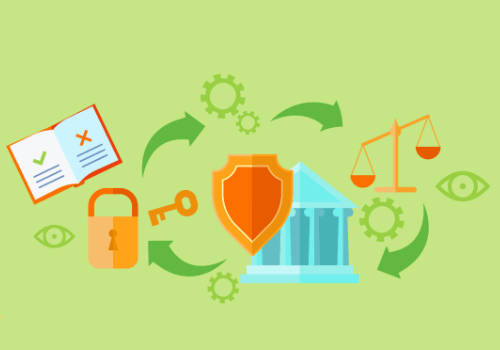eLearning Games In Compliance Training
Compliance may be the last area of eLearning that you expect to see a game, but using serious games as part of a compliance programme can reach learners in ways that a more traditional approach can’t.
Too many staff think compliance training is dull and boring and are ready to dismiss it as a check-box exercise. Incorporating a new style of learning can shake up any course and that’s something compliance training needs.
Why eLearning games?
Elearning games are fun, that’s why people choose to play them. ELearning isn’t always fun, and that can put people off. The more elements like interactivity and enhanced gameplay you incorporate into your eLearning the more engagement you’ll see.
But more importantly, eLearning games have characteristics that make them more suitable for certain types of training, including compliance training.
Some staff may dismiss an eLearning game as a gimmick, until they actually play one that’s designed properly and helps them to learn new skills.
Elearning games don’t replace the rest of the learning, but they can achieve things that are difficult to replicate with a conventional approach.
What goes on when you play an eLearning game?
In eLearning games, you can take risks, you don’t worry about consequences, you learn from mistakes. You can start to see how this can be applied to training like compliance.
We are all natural problem solvers; give someone a goal and some rules and they will find their way to the solution.
A well-designed eLearning game will allow you to fail and learn from your decision. You can move on and try again until you get the right answer, and when you do you’ll retain that information.
Why compliance games?
Compliance is about rules, eLearning games are designed to teach you rules through trial, error and repetition without you even knowing you’re learning them.
If I asked you to tell me the rules of Tetris the chances are you’d have a pretty complete list, certainly enough to allow me to play it straight away. Have you ever read the Tetris instruction manual? How many assessments have you taken on Tetris?
When you play an eLearning game you try out different tactics to see how you can achieve the goal, there’s no fear of failure because you’ve got another life.
A lot of the focus in compliance training is on completion, making sure that all staff required to take a course have finished it. One of the trademarks of well-designed eLearning games is replayability.
Design an effective eLearning game and your staff will not only want to complete it, they will want to replay it over and over.
Games improve high speed decision making, which can be important in many compliance scenarios like health and safety. Some compliance situations would benefit greatly from fast response times and any practice you can give your staff will help when they need it in real life.
An eLearning designer will be offering feedback to the learner whenever possible, within an eLearning game environment they get immediate and constant feedback on their actions.
Giving the learner the opportunity to see how they are progressing throughout the process is invaluable in learning.
Who’s using eLearning games?
You don’t have to look far to find examples of serious games being used to educate and train everyone from schoolchildren to professionals.
- Government agencies
The FAA (Federal Aviation Administration) approve certain flight simulators for logging time against pilot training. This kind of simulation is the perfect example of a game-type environment being a better place to learn and make mistakes than in real life.
Games in eLearning give you the chance to experience extraordinary or hazardous events and see how you would react to them. A highly competitive industry with a lot of regulation, the aviation sector is a good example of how eLearning games like simulations are used to reduce costs.
- Retail business
Baby goods retailer, Mothercare is using game elements as part of its Staying Safe at Work programme, allowing learners to explore the real life scenarios that they could encounter in a warehouse or shop floor without fear of failure.
- IT services companies
IBM developed the City One game as part of their smarter planet initiative. It served two purposes, engaging potential clients who are interested in their services and showing people the reality behind running a city.
Getting people interested in the decisions that are made when managing a city’s resources and people is a hard task and a game is one way that IBM have been able to do it successfully.
Microsoft are using Minecraft to teach kids how to code, and you can try it out on line. It shows how a game can be used to train people on underlying principles that aren’t always obvious.
Programming involves following rules and logic to produce the right result so, like with compliance, eLearning games are a natural way to teach these skills.
All of these examples show that by providing your staff with the tools to explore and learn about the issues through experience you can reap the rewards. Whatever your compliance needs it’s worth considering an eLearning game as part of the solution you offer to your learners.

